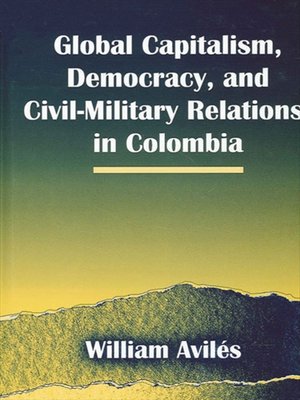Global Capitalism, Democracy, and Civil-Military Relations in Colombia
ebook ∣ SUNY Series in Global Politics
By William Avilés

Sign up to save your library
With an OverDrive account, you can save your favorite libraries for at-a-glance information about availability. Find out more about OverDrive accounts.
Find this title in Libby, the library reading app by OverDrive.



Search for a digital library with this title
Title found at these libraries:
| Library Name | Distance |
|---|---|
| Loading... |
Explores the connections between globalization and democratization in Colombia.
Through the lens of global capitalism theory, William Avilés examines democratization and civil-military relations in Colombia to explain how social and international forces led to the ostensibly contradictory outcome of democratic and economic reform coinciding with political repression. Focusing on the administrations in power from 1990 to the present, Avilés argues that the reduction in the institutional powers of the military within the state reflected changes in the structure of the global economy, the emergence of globalizing technocrats and politicians, and shifts in U.S. foreign policy strategies toward "democracy promotion." These same factors explain Colombia's establishment of a low-intensity democracy-a structure of elite rule in which the strategies of coercion (state and para-state repression) and consensus (competitive elections, civilian control over the military) maintain control and legitimacy. In the age of capitalist globalization, a low-intensity democracy is most concomitant with neoliberalism, establishing the political and economic environment most suitable to the investments of transnational corporations.







